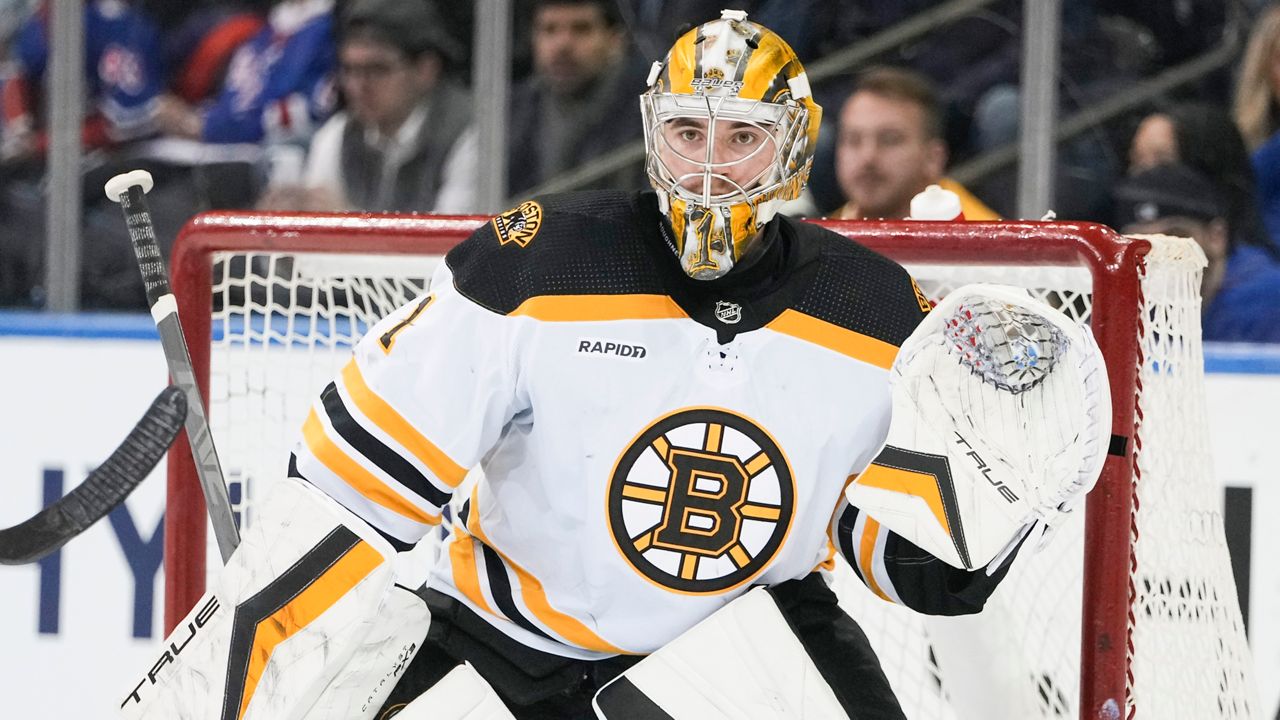
Why I Did Not Pass the Ball to Elias Lindholm Against the Washington Capitals: Jeremy Swayman Breaks His Silence
In a season filled with ups and downs, no moment has sparked as much conversation among hockey fans as Jeremy Swayman’s controversial decision during the recent matchup between the Boston Bruins and the Washington Capitals. As the tension mounted and the game hung in the balance, Swayman’s choice not to pass the puck to fellow teammate Elias Lindholm left spectators and analysts alike scratching their heads. Today, Swayman opens up about that pivotal moment, offering insight into his thought process and the emotions that ran high on the ice.
The Moment That Sparked Debate

The game, held at TD Garden, was a nail-biter from the first puck drop. With both teams vying for critical points in the standings, the atmosphere was electric. The Bruins, known for their resilience and teamwork, found themselves in a tight contest against a Capitals squad eager to reclaim their dominance in the league. As the clock ticked down, the Bruins had a chance to break the deadlock.
With just under two minutes left in the third period, Swayman intercepted a pass and found himself with the puck in a high-pressure situation. He spotted Lindholm in a prime scoring position, one that could have swung the momentum in favor of the Bruins. Fans held their breath, anticipating a swift pass that would set up a high-percentage shot. But instead, Swayman hesitated, opting to keep the puck for himself. The decision was met with gasps from the crowd and raised eyebrows from analysts, sparking a flurry of questions in the post-game analysis.
Swayman’s Reflection on the Decision
In an exclusive interview with our sports team, Jeremy Swayman finally addressed the decision that left many questioning his instincts. “It was a split-second choice,” he explained. “In that moment, I felt a mix of adrenaline and instinct. I know Elias is a phenomenal player, and I trust him completely. But I also felt the need to take control of the situation myself.”
The young goaltender reflected on the internal conflict he faced. “When you’re out there, every player is a potential option. You want to make the best decision for the team, but sometimes the pressure can cloud your judgment. I thought about making the pass, but I also felt a strong pull to drive the play forward. I wanted to create an opportunity, not just for myself but for the team.”
Understanding the Game’s Dynamics
Hockey is as much a mental game as it is physical, and Swayman’s experience highlights the psychological factors that come into play during critical moments. “You practice scenarios like this thousands of times,” he noted. “But when you’re in the heat of the moment, things can feel entirely different. It’s all about reading the game and trusting your instincts.”
Analysts have pointed out that goaltenders often have a unique perspective on the ice. Swayman elaborated on this, explaining how his position allows him to see plays unfold differently than skaters. “I have a view of the entire ice,” he said. “In that moment, I felt I could take it up the ice myself and create something more dynamic. It was a judgment call based on what I saw.”
Fan Reactions and Media Buzz
The aftermath of the game saw a deluge of reactions from fans and media. Social media platforms buzzed with heated debates over Swayman’s decision. Some fans praised his confidence and initiative, while others questioned his judgment, suggesting that he missed a golden opportunity to set up a more experienced scorer.
“I get it; emotions run high during games,” Swayman admitted. “I appreciate the passion of our fans. They want to see the best from us, and it’s only natural to want to dissect every decision. But at the end of the day, I’m human. I’m learning and growing with each game, and I hope they can see that.”
Building Trust and Team Chemistry
Swayman’s relationship with his teammates, particularly Lindholm, remains strong despite the incident. “We’ve talked about it, and Elias is a great guy. He knows that sometimes things don’t go as planned,” Swayman said. “What matters is that we communicate and build that trust. Hockey is a team sport, and every game is an opportunity to grow together.”
Lindholm echoed similar sentiments, praising Swayman for his efforts in the game and emphasizing the importance of teamwork. “We all have our roles, and Jeremy is an incredible goaltender. We support each other, and moments like these help us understand each other better.”
Looking Ahead: Lessons Learned
As the Bruins prepare for their next game, Swayman is focused on learning from the experience. “I think about what I could have done differently, but I also realize that I have to let go of it and move forward,” he said. “Every game is a new opportunity, and I’m excited about what lies ahead.”
The incident has served as a learning experience not just for Swayman, but for the entire team. Head Coach Jim Montgomery has emphasized the importance of adaptability and communication among players, highlighting that moments like these can provide valuable lessons in trust and teamwork.
Conclusion: A Journey of Growth
In the fast-paced world of professional sports, split-second decisions can lead to moments of brilliance or regret. Jeremy Swayman’s decision not to pass the puck to Elias Lindholm against the Washington Capitals will likely be remembered as a defining moment of this season. However, it’s also a reminder of the complexities of teamwork, trust, and the ever-evolving nature of the game.
As Swayman continues to grow and adapt, Bruins fans can take comfort in knowing that their young goaltender is not just focused on the present, but also on becoming the best version of himself for his teammates and the franchise. The road ahead is filled with challenges, but with each game, Swayman is proving that he’s more than capable of rising to the occasion—both on and off the ice.
Leave a Reply